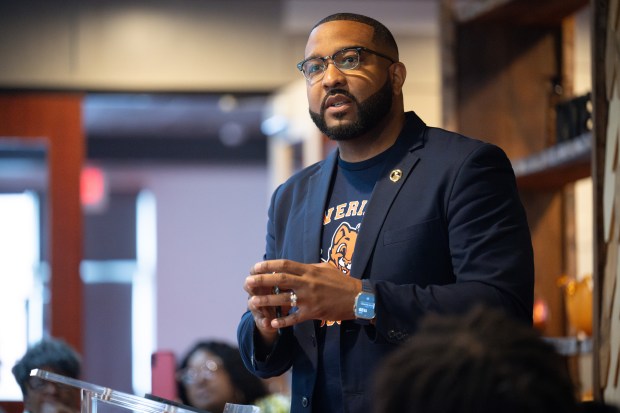Attorney General Todd Rokita sent Gary and East Chicago councilmembers letters warning of legal action against the cities after July 1 if the councils don’t rescind sanctuary city ordinances.
Senate Bill 181, a revival of a bill that failed in 2023, was authored by Sen. Eric Koch, R-Bedford, and would enable and compel Rokita, a Munster native, to bring lawsuits aimed at forcing governmental entities and educational institutions to comply with federal immigration authorities.
Governor Eric Holcomb signed the bill into law March 12. Earlier this month, Rokita sent East Chicago, Gary, West Lafayette and Monroe County officials a letter to rescind ordinances pertaining to immigration or the cities and county will face legal action.
Gary Mayor Eddie Melton said in a statement he has been made aware of the letter Rokita sent to the city council about the ordinance, and he will work with the council to address the matter. Melton said he’s been working with Holcomb to rebuild the city, and laws like Senate Bill 181 are just distractions.
“I respectfully ask the Attorney General Todd Rokita to help us out or leave us alone,” Melton said.
In 2017, the East Chicago Common Council passed a Welcoming City Ordinance that Mayor Anthony Copeland signed the next day, according to Rokita’s letter dated May 14 to the East Chicago Common Council.
In the letter, Rokita asked whether the East Chicago ordinance is still in effect, a demand to repeal the ordinance if it is still in effect, and to “inform the common council of the legal consequences of failing to repeal the ordinance.”
“Unless the ordinance has been repealed on or before July 1, 2024, probable cause will exist to bring an action against the City of East Chicago to compel its compliance with Indiana law – and I will do so,” Rokita wrote in the letter.
Copeland and East Chicago Councilmembers did not respond to requests for comment.
In 2017, the Gary Common Council voted 6-3 in favor of a welcoming city ordinance, which requires that any investigation by city officials into a person’s immigration status be court-ordered, and holds that city resources will not be used to enforce federal immigration law.
Karen Freeman-Wilson, then Gary’s mayor, backed the legislation, which was drafted in response to a Trump administration crackdown on undocumented immigrants.
Gary’s ordinance prompted a lawsuit from four Indiana residents who claimed that it violated a 2011 Indiana law banning so-called “sanctuary cities,” which prohibits cities and other local governments from refusing to communicate or cooperate with federal immigration authorities in order to shield people who have entered the country without legal permission.
The lawsuit was dismissed in 2022 after the Indiana Supreme Court ruled the plaintiffs had not suffered an injury and thus had no standing to sue.
Later the same year, the state appellate court held that two plaintiffs who challenged a similar East Chicago ordinance also lacked legal standing.
Melton said laws like Senate Bill 181 target Gary and do not help him “move the city or the state of Indiana forward.”
“As Mayor of Gary, all I want is to create opportunities for my community to flourish. Unfortunately, within the first six months of my administration we have repeatedly experienced unwarranted attacks and been dragged into national political debates around immigration and guns,” Melton said.
akukulka@chicagotribune.com





